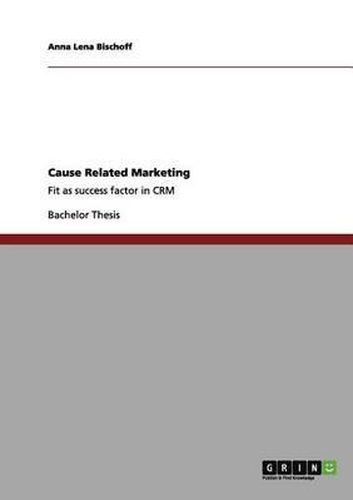Readings Newsletter
Become a Readings Member to make your shopping experience even easier.
Sign in or sign up for free!
You’re not far away from qualifying for FREE standard shipping within Australia
You’ve qualified for FREE standard shipping within Australia
The cart is loading…






Bachelor Thesis from the year 2011 in the subject Business economics - Marketing, Corporate Communication, CRM, Market Research, Social Media, grade: 1,0, University of Hamburg (Lehrstuhl fur BWL, insbesondere marktorientiertes Medienmanagement), course: Marketing, language: English, abstract: The combination of efforts of Profit-Organizations (POs) and Non-Profit-Organizations(NPOs) to benefit from a collaboration has gained increased attention throughout the last couple of years (Belch & Belch, 2004). Events such as the BP oil leak in the Gulf of Mexico, the Enron scandal or the fraudulent participation of investment banks in the most recent financial crisis have fueled the discussion of ethical codes of conduct for corporations, their social responsibility in society and thus their social commitment(Kotler & Lee, 2005), (Hess, Rogovsky, & Dunfee, 2002), (Horrigan, 2010). The contribution of business entities in social causes made them consider their possibilities to not only act socially responsible, but profitable at the same time (Zdravkovic, Magnusson, & Stanley, 2010). This called marketers to action, designing strategies that would highlight a company’s willingness to do good, advance the company’s reputable image, enhance customer retention and increase sales (ib.).The success of this new and uprising type of marketing, CRM, is determined by many factors, one of them being the fit of the collaborating partners (Fries, 2010). The aim of this work is the presentation of the current state of research of the success of CRM. A further objective of this thesis is the systematic elaboration of empirical studies to draw conclusions about possible effects on the success of CRM campaigns.
$9.00 standard shipping within Australia
FREE standard shipping within Australia for orders over $100.00
Express & International shipping calculated at checkout
Bachelor Thesis from the year 2011 in the subject Business economics - Marketing, Corporate Communication, CRM, Market Research, Social Media, grade: 1,0, University of Hamburg (Lehrstuhl fur BWL, insbesondere marktorientiertes Medienmanagement), course: Marketing, language: English, abstract: The combination of efforts of Profit-Organizations (POs) and Non-Profit-Organizations(NPOs) to benefit from a collaboration has gained increased attention throughout the last couple of years (Belch & Belch, 2004). Events such as the BP oil leak in the Gulf of Mexico, the Enron scandal or the fraudulent participation of investment banks in the most recent financial crisis have fueled the discussion of ethical codes of conduct for corporations, their social responsibility in society and thus their social commitment(Kotler & Lee, 2005), (Hess, Rogovsky, & Dunfee, 2002), (Horrigan, 2010). The contribution of business entities in social causes made them consider their possibilities to not only act socially responsible, but profitable at the same time (Zdravkovic, Magnusson, & Stanley, 2010). This called marketers to action, designing strategies that would highlight a company’s willingness to do good, advance the company’s reputable image, enhance customer retention and increase sales (ib.).The success of this new and uprising type of marketing, CRM, is determined by many factors, one of them being the fit of the collaborating partners (Fries, 2010). The aim of this work is the presentation of the current state of research of the success of CRM. A further objective of this thesis is the systematic elaboration of empirical studies to draw conclusions about possible effects on the success of CRM campaigns.